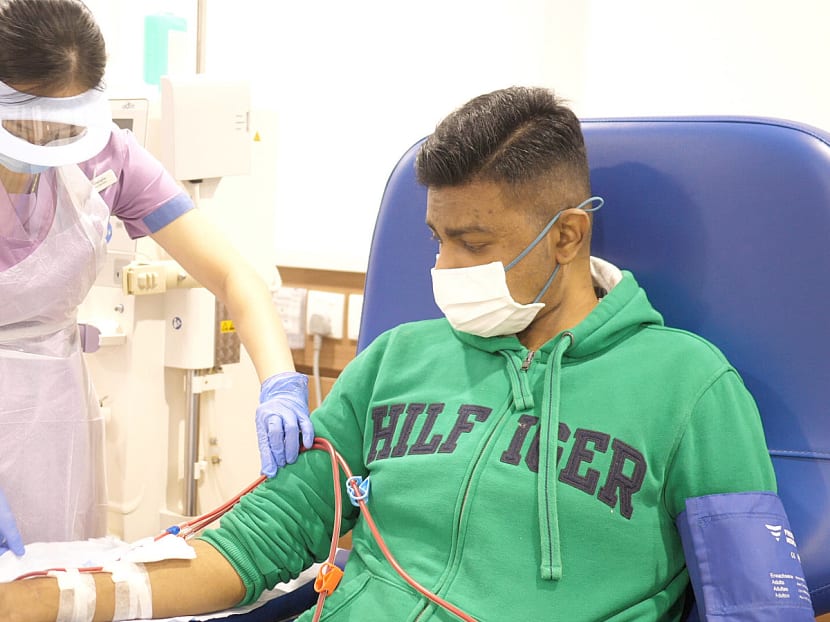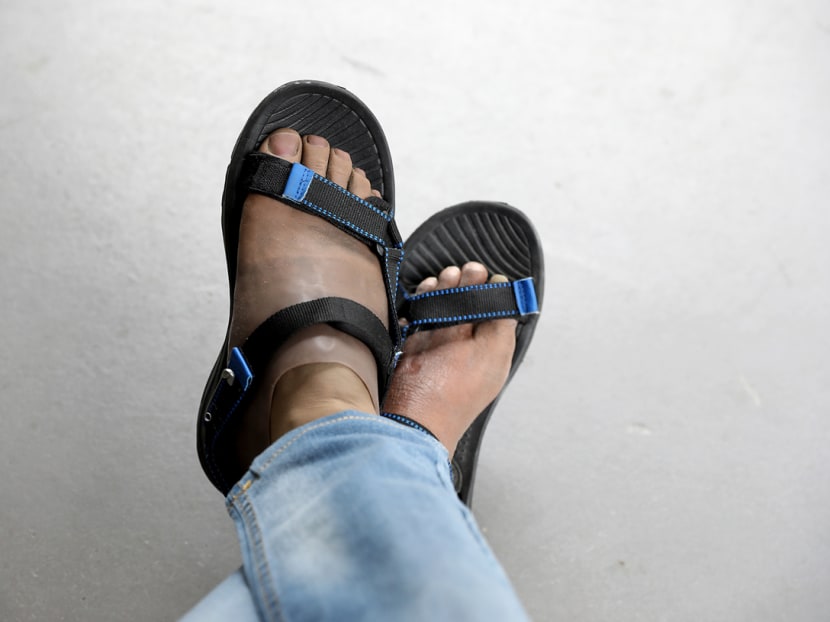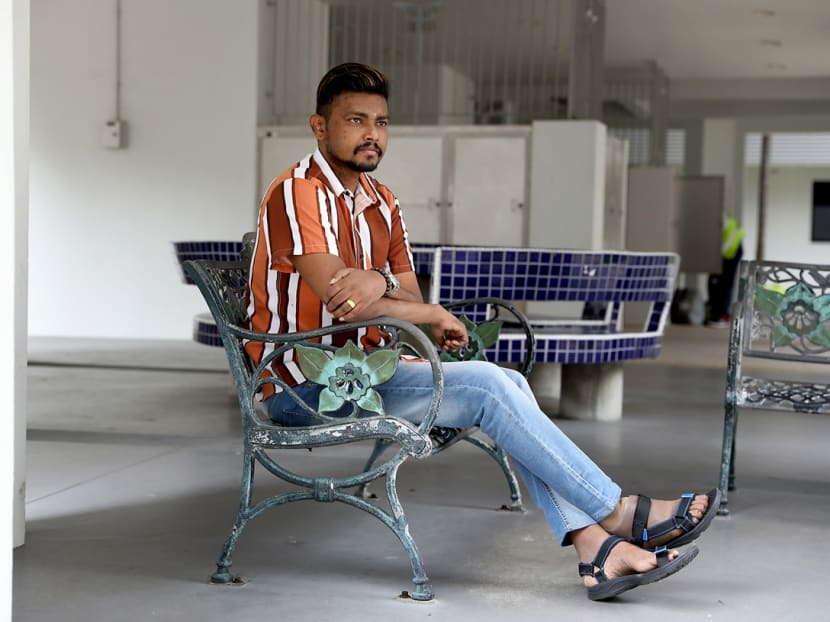At 38, he has lost a foot, his kidney function and a promising career due to diabetes
SINGAPORE — Freelance accountant Shashitharen Ambalaka is only 38 but the Singaporean's life has been upended by diabetes. In the past six years, the chronic disease has robbed him of his right foot, his kidney function and the ability to take part in his favourite sporting activities.

Mr Shashitharen Ambalaka (pictured) undergoing haemodialysis. He is among some of the youngest adult patients admitted to the National Kidney Foundation.
- A 38-year-old freelance accountant tells how diabetes wrecked his health, marriage and career
- The Singaporean underwent a foot amputation, suffered a stroke and now has kidney failure
- Diabetes is one of the main causes of kidney failure in Singapore
- The patient is among the youngest patients undergoing dialysis at the National Kidney Foundation
- Support from his loving family and practising mindfulness meditations keep him going
SINGAPORE — Freelance accountant Shashitharen Ambalaka is only 38 but the Singaporean’s life has been upended by diabetes. In the past six years, the chronic disease has robbed him of his right foot, his kidney function and the ability to take part in his favourite sporting activities.
His foot was amputated in 2015 and he suffered a stroke in 2019.
Six months after the stroke, he was diagnosed with diabetes-induced kidney failure.
He now needs dialysis to survive and moves around on a prosthetic foot.
Speaking to TODAY about his condition ahead of World Diabetes Day, which is on Nov 14, Mr Shashitharen hopes that more young adults would pay attention to their health and be aware of the risks of the chronic disease.
“Diabetes is not a joke,” he said. “Even if you feel fine now, it is killing everything inside you. And you just don’t feel it right away.”
Singapore has one of the highest prevalence of diabetes in Southeast Asia.
Around 14.2 per cent of the adult population here have diabetes, the latest figures by the International Diabetes Federation showed.
Now on thrice-weekly haemodialysis, Mr Shashitharen is among some of the youngest adult patients admitted to the National Kidney Foundation (NKF). Haemodialysis cleanses the blood of toxins, extra salt and fluids through a machine.
Diabetes is one of the main causes of kidney failure in Singapore.
Dr Rachel Teo, consultant nephrologist with NKF, said that about two-thirds of the patients on dialysis it sees have kidney failure due to diabetic kidney disease.
Patients aged 40 and younger make up under 4 per cent of the patients on dialysis at NKF.
Poorly controlled diabetes also increases the risk of stroke.
Mr Shashitharen was diagnosed with diabetes when he was a teenager, after his teachers noticed his drastic weight loss.
Diabetes runs in his family. He has Type 1 diabetes, in which the body produces little or no insulin. By 21, he was prescribed daily insulin jabs.
Being an active youth who took part in sports such as football, basketball and taekwondo at the time, he did not think that it was a serious matter.
“I was young and had so much energy then. Even after I was diagnosed, I continued with my usual diet, eating several portions of rice at every meal.
“Most of the time, I didn’t take my insulin jabs because they felt like a hassle. I wondered why I had to go through all those jabs when I could still play sports as well as my friends.”
A WAKE-UP CALL
After he turned 30, though, he noticed a decline in his health and fitness levels.
From being able to run 10km to 15km easily, he started feeling numbness in his legs and got tired easily.
However, it was not until he lost his right foot at 32 that he said he “woke up”.
During a pilgrimage to India, he developed burn wounds on the sole of his right foot because he had to be barefoot in the temple. He recalled that the daily temperature there was around 40°C to 41°C and the grounds were very hot.
“When I returned home, my foot was already heavily infected and I was running a very high fever.”
The wound would not stop bleeding and could not heal. All of his toes turned black.
Eventually, the top half of his right foot was amputated.

Although he managed to save his leg, the loss of a foot was a great blow to the active young man, who was at the prime of his life working as an accountant. He had gotten married two years before.
“I was devastated and had so many questions: Would I be able to still work? Would my employer take me back as I had to take two to three months of medical leave to heal?
“How would my family look at me after this? Would I be able to go back to the same lifestyle? That incident changed my view on diabetes,” he said.
After the foot amputation, Mr Shashitharen followed the doctor’s orders and took his medication regularly.
He also changed his diet drastically by cutting down on his intake of refined carbohydrates, salt and sugar.
Instead of white rice, he opted for brown rice or basmati rice, which has a lower glycaemic index and does not affect his blood sugar as rapidly. He stopped taking carbonated drinks and fast food.
“The temptation is still there once in a while but when it comes, I will look at my foot and tell myself ‘no’,” he said.
While trying to put his health in order, Mr Shashitharen struggled with other aspects of his life.
Adaptations had to be made to his work environment when he returned to work. His office was re-located from the fourth storey to the ground level because there was no elevator in the building and he was moving around in a wheelchair at the time.
He left the company after a year because he felt demoralised by the lack of progress in his career.
“I was on the route to be in a management role but after my medical condition, the company stopped my promotion.
“It is normal for an organisation to do that and I don’t blame my superiors, because why would you put a person with disability in a management role?”
Then in 2017, Mr Shashitharen experienced another blow when his wife left him. The couple have no children and they are now separated.
After the separation, he tried to pick up the pieces of his life.
He tried new experiences such as going skydiving during a holiday trip in New Zealand, and focused on working hard to finance his home.
He had a new accounting job and would supplement his income by working as a driver for a ride-hailing firm outside work hours, often driving until midnight.
MORE HEALTH SETBACKS
Although he was no longer eating unhealthy foods, the stress, hectic work life and irregular meals eventually caught up with Mr Shashitharen.
In September 2019, he had a stroke that left the left side of his body paralysed. He recalled how helpless he had felt on the day the stroke occurred.
“I had gone home after a tiring day of work. Then I felt as if the whole room was spinning and I vomited.
“There was no one at home to reach out for help. In the morning, I managed to call my mum for help, but by then I was no longer able to move my left leg and arm.”

After his stroke, he moved to his parents’ home. Despite making good progress with his rehabilitation half a year later, at the start of the Covid-19 pandemic, Mr Shashitharen was hit by another devastating news.
Both his kidneys have been irreversibly damaged by diabetes and he would require dialysis to survive.
Severe water retention set in, and there was 30kg of excess fluids in his body.
HOW DIABETES DAMAGES THE KIDNEYS
Dr Teo from NKF said a study here found that more than half (53 per cent) of patients with diabetes have chronic kidney disease. This is “alarming”, she said. The figure reported in other parts of the world is lower at 30 to 40 per cent.
Dr Teo explained that high blood sugar levels from diabetes can cause damage to the micro-structure (filtration units and small blood vessels) of kidneys over time.
High blood pressure and obesity can also contribute to kidney damage.
“If these risk factors are not well-controlled, it can accelerate kidney damage and loss of function, resulting in kidney failure eventually.”
Dr Teo said that changes in the kidneys due to diabetes can start occurring within two years after a diabetes diagnosis.
There are no symptoms in the early stages of kidney disease, which is why patients may not be aware that they have the disease until it has advanced.
In people who have diabetes, early detection through screening with simple blood and urine tests is key.
This is so that effective medical treatment can be offered promptly to prevent kidney disease from getting worse and causing other health problems, Dr Teo said.
“There is well-established evidence that more intense blood sugar control early in the course of diabetes can prevent irreversible damage and reduce the risks of developing albuminuria and loss of kidney function (diabetic kidney disease).
“It can also reduce the risks of other complications such as eye disease (retinopathy) and nerve damage (neuropathy).”
Albuminuria, which refers to leakage of albumin (a type of protein) in the urine, is an early sign of kidney disease.
Dr Teo said that primary healthcare providers play an essential role in regular screening of those at high risk for kidney disease, especially patients with diabetes and high blood pressure.
“It has been suggested that screening for diabetic kidney disease should be performed yearly for patients with Type 1 diabetes beginning five years after diagnosis, and yearly for patients with Type 2 diabetes from the time of their diagnosis,” she added.
PHYSICALLY AND MENTALLY DRAINED
Apart from worrying about his health, Mr Shashitharen was also worried about bread-and-butter issues, and whether he could afford dialysis three times a week for the rest of his life.
Having had stroke before, he is not eligible for a donor kidney transplantation from someone who dies.
“It’s been only around five years, but so many things have happened to me. People say that I’m strong but I feel that it is so tiring,” he said.
The Covid-19 pandemic has also made it harder for him to get a full-time job. Mr Shashitharen is now doing freelance work to make ends meet.
“With Covid-19, normal people already have trouble finding jobs; what more a person with a medical condition like myself?”
Due to his current financial situation, he does not need to pay for his dialysis treatments at NKF, which offers treatment subsidies for its patients. He is also grateful for financial support he gets through the Social Service Offices of the Ministry of Social and Family Development.
KEEPING SANE WITH MEDITATIONS
To keep from being weighed down mentally by his poor health, Mr Shashitharen started practising mindfulness meditations.
He practises it daily and during his long dialysis sessions to calm his emotions and clear his mind.
“It keeps me sane,” he said.
He has started attending the NKF Mindfulness Meditation Support Group, which started recently and takes place online due to infection controls for Covid-19. It is led by the foundation’s medical social workers, clinical psychologist and a psychology intern.
The support group was initiated to enable dialysis patients and staff members to learn psychological coping strategies, to better manage feelings of isolation during the pandemic.
Mr Shashitharen said: “When you’re on dialysis, you have to spend four hours every other day on something you do not like.
“Initially, when I first started dialysis, I kept thinking about why I had to go through this at such a young age when everyone else around me doing dialysis were elderly.
“Practising mindfulness during dialysis has helped me to stay focused on my treatment.”
Dr Yen Wong, NKF’s senior clinical psychologist, said that good mental health is essential for people with kidney disease.
Left untreated, mental health may reduce motivation for self-care, necessary for successful dialysis treatment.
In general, young adults on dialysis tend to report a reduced quality of life and independence, and increased traits of anxiety and depression, Dr Wong noted.
This is because they are more likely to experience disruptions in their education and work.
“They may also report body image issues and decreased social interactions. The perceived uncertainty in life may deter them from forming a family unit and may perpetuate a sense of having thwarted life goals,” Dr Wong said.

Mr Shashitharen’s hopes for the future is to have a more stable income and take care of his family who have stood by him all this time. He said that his family — his parents and younger brother — is his pillar of strength and support.
“Without them, I don’t know where I’ll be now. My dad is not an expressive person but I can feel that he is sad. My mum’s love for all of us is unlimited, and I look up to her.”
In Singapore where it is so easy to grab a bite round-the-clock, he said that people should keep their health in mind at all times and not take chronic diseases such as diabetes lightly.
“Everywhere we go, there’s so much unhealthy food and drinks available at our convenience. I think it’s important to not let the marketing pressures get to you,” he said.
“There are many ‘blocks’ that form the foundation of our lives. Health is the first ‘block’ and if that falls, everything else – your family, career, income, house – goes down with it like dominoes.”









